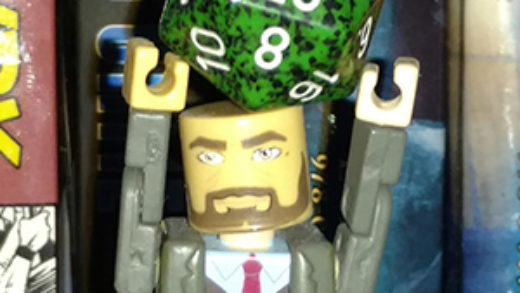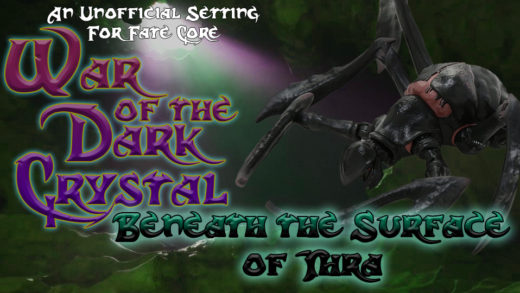There are a number of gaming stories about GMs asking players to create characters with a specific genre or setting only to change the nature of the game at the beginning of the campaign. While the bait and switch can often lead to a gaming nightmare, there are good ways to do it.
A Personal History
I’ve been on both sides of the screen in bait and switch gaming; sometimes good, sometimes bad. My earliest recollection of being unprepared for a campaign shift was expecting an AD&D Forgotten Realms game only for all the characters to find a Spelljammer ship and take to the phlogiston. Since then, I’ve seen and/or used most of the standard gaming bait and switch tropes including, but not limited to:
- Characters recruited for time travel or flung into another time
- Transported to a different realm
- The apocalypse is now
- It’s now a horror game
- It’s now a super hero game
- It’s no longer a super hero game / you’re now normal mortals
- Everyone dies, you’re now all ghosts/undead
- The first few sessions were a shared dream or psych experiment and you wake in a different reality
In the mid-90’s one of my groups almost exclusively played GURPS. The “any genre” nature of the system and supplements lead me to run a number of genre-shifting campaigns. To the point where it was almost expected that my games would not be what the players initially signed up for. Thankfully, the friendship in the group was strong enough that it never broke the games; but, in retrospect, that era was not my golden age as a GM.
Judging by forums and discussions, most players don’t like having their expectations of a game subverted. Too often a shift in genre or tone leads to resources and backstory for their characters being lost. Pulling the rug out from under players can also lead to a mistrust of the GM—trust that can be difficult to win back. But sometimes a bait and switch can be fun and a shift in genre can lead to character growth and development. Here are some do’s and don’ts I’ve learned along the way.
The Established Group
First and foremost, a plan to shift the game from its stated premise should only be done with an established group. Even when done right the bait and switch can be seen as a breach of trust. A foundation of trust is required to endure any cracks.
Game Promises
When discussing the game or campaign with the players it’s crucial not to lie to the players. If planning a horror or supernatural game under the guise of a different genre and a player asks if the supernatural or magic exists saying, “no,” would not be the right response. It’d be better to inform the player that the world and the characters were not aware of anything unworldly.
Ideally, the expectation of a genre shift should not be hidden. It can be part of the game premise, keeping the players unaware (but suspecting) of how the game will change. This is most easily accomplished by telling the players that the campaign “will start as” and outlining the “bait” world. Emphasizing the “start as” or even outright telling players that the game will change dramatically prepares the players for the switch and helps enforce a trust in the GM.
Player Agency
One of the key reasons players don’t like a bait and switch campaign is that it erodes their influence on the game. A change in genre often strips away resources, undermines backstory, or invalidates contacts and connections. Even if these commodities can be replaced by the GM, it would not be with what the player had envisioned or written.
Like setting campaign expectations, it’s important that the GM work with the players and discuss the things they may lose at the time of the genre shift. If the characters are going to be transported to a different world or timeline, let the players know before they begin playing their characters that these things will be taken from them in one way or another. If equipment or resources are going to be invalidated or worthless with the game shift, prepare those expectations.
These preparations can be done subtly, but it’s crucial a player understand that their agency may be subverted but with the promise and expectation that nothing they paid for will not be replaced in a different way. Then, once the switch occurs, work directly with each player to determine how to replace what they lost; restore their agency by making their ideas part of the “new” game.
Adventure vs Campaign
One exception to a genre shift is if the switch is short-lived with the promise of returning to the original promise/campaign. A short amount of sessions in a different world for the characters may temporarily affect their backstory or resources, but it doesn’t break their agency. Near the end of the shift, GMs may offer the option for the players to continue in the “new world” or return to the original campaign.
If staying with the switch, it would still be important that players be able to replace any lost resources in one form or another. Perhaps a once wealthy character’s money is now useless but something in their possession could be sold to recoup their losses. This would keep their character concept intact. Alternatively, that character’s monetary resource may be lost and the player could re-distribute the points towards skills or contacts. These types of player changes could either be accomplished by a “flash-forward to a month later” in the campaign or with the discussion that they’re re-gaining their resources (easily) through play.
Extending a Campaign
A bait and switch game is one in which expectations are subverted early. But the premise of a genre shift has been used to extend a campaign once the original goal or ideas have been met. If the characters have defeated a powerful figure a game might transform into a more political campaign as the victors work to ensure a new evil doesn’t step into the power vacuum left behind. Perhaps vanquishing the evil opens a portal to a new world for the protagonists or the death of the big bad creates an extra-dimensional power surge, flinging the heroes to another time.
Even in the shift of a long-running campaign the do’s and don’ts above apply. Working with the players to ensure their agency and, in this case, hard work, aren’t lost.
Same Player, New Character
Even when attempting to keep or restore player agency a shift in genre may have a player wanting to drop their character. The player may feel their backstory was too critical to their character or their character doesn’t feel suited to the change in style or gameplay. This may allow the player to create a character to help guide the other players, avoiding the need for an NPC proxy. However, though the player character may know more about the shifted world than the others, they should not become the star or sole repository of knowledge for the campaign—after all, no one knows everything.
If multiple players are asking to drop their characters because of the switch, then something was not properly communicated in those promises. I wouldn’t say the campaign was “ruined” if this occurs, but the idea of “characters in a strange land” may need to be re-thought and re-discussed.


Recent Comments